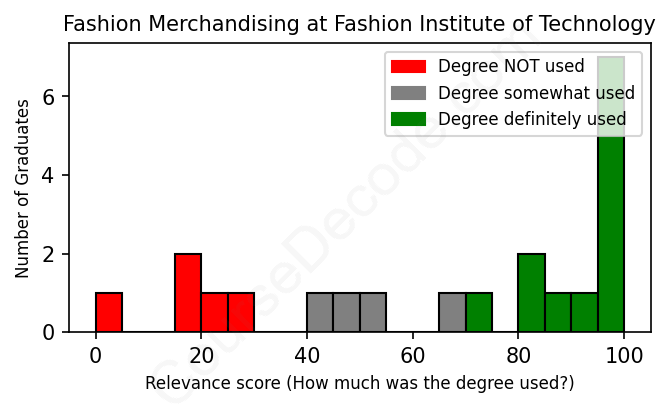
First, some facts. Of the Fashion Merchandising graduates from Fashion Institute of Technology we've analyzed , here's how many have used (or NOT used) their degree in their career:

These are estimates based on AI analysis of 21 LinkedIn profiles (see below).
The verdict? Slightly below average. Overall, with an average relevance score of 66%, Fashion Merchandising graduates from Fashion Institute of Technology have a slightly lower likelihood (-1%) of finding work in this field compared to the average graduate across all fields:
And for comparison, here's the chart for all profiles we've looked at across all degrees.
Also, after graduating, only 14% of these graduates have pursued further education other than another Bachelor's degree (such as a Masters degree or other), compared to the average across all profiles of 35%. This suggests a Bachelors degree is enough for most Fashion Merchandising graduates, and it's normal to look for work straight after graduation.
See the details:
|
Relevance score: 94% We think this person has gone into a career highly relevant to their degree. We think this person has gone into a career highly relevant to their degree.
DEGREE INFOGraduated in 2013 from Fashion Institute of Technology with a Bachelor of Applied Science (BASc) in Fashion Merchandising. No other secondary education since. JOB HISTORY SINCE GRADUATIONWholesale Intern JIL SANDER Aug 2013 - Dec 2013 Assistant Account Executive  GUESS?, Inc. Oct 2014 - Sep 2016 Jr. Wholesale Planner  GUESS?, Inc. Sep 2016 - Jun 2017 Amazon Planning and Operations  GUESS?, Inc. Jun 2017 - Dec 2017 Planner  Christmas Tree Shops Jan 2018 - Oct 2021 Account Planning Manager  Ralph Lauren Nov 2021 - Present ABOUTNo information provided. |
The top 10 most common jobs done by the graduates we've analyzed (ranked most common to least) are:
When looking at the LinkedIn profiles of individuals who graduated from the Fashion Institute of Technology with a degree in Fashion Merchandising, it's clear that many of them have found work that directly relates totheir field. The most common jobs seem to be within costume design, wardrobe assistance, and merchandising roles like buyers and account executives. These positions typically make use of the skills and knowledge acquired during their coursework, such as trend analysis, product selection, and visual merchandising. For example, roles like Account Executive at various fashion brands and Assistant Buyer at retail companies often involve a strong application of fashion merchandising principles, allowing graduates to apply what they've learned in meaningful ways.
On the flip side, there are also quite a few profiles that reveal a less direct connection to fashion merchandising. Some graduates have taken on roles in fields like mental health, consulting, and even law, which do not align closely with their education. While any job can build a range of useful skills, it's evident that not all these career paths leverage the specific merchandising knowledge they gained from their degree. Overall, while many graduates have successfully pursued careers very much like those they studied for, there is a noticeable split, with some opting for very different paths altogether.
Here is a visual representation of the most common words in job titles for Fashion Merchandising graduates (this is across all Fashion Merchandising graduates we've analyzed, not just those who went to Fashion Institute of Technology):

Graduates from the Fashion Institute of Technology with degrees in Fashion Merchandising seem to follow a diverse array of career paths. For many of them, the first jobs after graduation often lean toward internships and entry-level roles in fashion-related fields such as styling, merchandising, and design. It's common to see recent grads starting as interns, assistants, or sales associates in well-known brands like Burberry, La Perla, and even direct roles in costume design for film and theater. This initial experience helps build a solid foundation in the industry. For example, many grads from the early 2010s had their start as wardrobe assistants or interns before they climbed the ranks to become account executives, buyers, and even fashion designers over the years.
Fast forward five years or so, and you'll notice a significant shift. Many alumni have transitioned into more established roles, often progressing into positions of greater responsibility, like Product Managers, Senior Account Executives, and even Owners of their own businesses. This upward trajectory suggests that those who stay in the fashion industry tend to do well, finding roles that align closely with their degrees. However, there are also some outliers. A few graduates have veered off course into unrelated fields like mental health or education, which raises the question of whether the degree truly prepared them for diverse paths or if they found the fashion world didn’t suit them after all. Overall, while many graduates seem to find meaningful careers in fashion, a notable number also pursue completely different professional avenues, leading to varied outcomes based on individual choices and experiences.
Honestly, a Bachelor’s degree in Fashion Merchandising, especially at a school like the Fashion Institute of Technology (FIT), can be pretty challenging but also rewarding. It’s not just about picking out pretty clothes; you’re dealing with a lot of stuff like marketing, trend analysis, and even supply chain management, which can get pretty technical. The coursework can involve a lot of projects, presentations, and even some math, so if you’re more of a creative type, get ready to stretch your brain in new ways. While it's not as intense as some of the sciences or engineering degrees, you definitely need to be organized and put in the effort to keep up with everything. Overall, it’s a solid mix of fun and hard work!
Most commonly, in the LinkedIn profiles we've looked at, it takes people 4 years to finish a Bachelor degree in Fashion Merchandising.
Looking at the career paths of these Fashion Institute of Technology grads, it's a bit of a mixed bag when it comes to their earnings. The more seasoned graduates generally started in roles related to costume design or fashion merchandising, where earnings can vary greatly, especially if they're freelancing like wardrobe assistants or costume designers. However, as they moved up—especially into corporate roles (think account executives and buyers at big-name brands)—it seems they likely started raking in a decent paycheck. Some, like the ones who shifted into higher management or specialized roles in therapy or finance, probably found themselves in more lucrative positions over time. Overall, it looks like those who stuck with the fashion industry progressed pretty well, but there's definitely a clear journey in there that involves a mix of lower starting salaries and the hustle to climb up.
Here is a visual representation of the most common words seen in the "about" section of LinkedIn profiles who have a Bachelor degree in Fashion Merchandising (this is across all Fashion Merchandising graduates we've analyzed, not just those who went to Fashion Institute of Technology). This may or may not be useful:

Here are all colleges offering a Bachelor degree in Fashion Merchandising (ordered by the average relevance score of their Fashion Merchandising graduates, best to worst) where we have analyzed at least 10 of their graduates:
| College | Score | Count |
|---|---|---|
 LIM College LIM College
|
70 | 43 |
 University of North Texas University of North Texas
|
69 | 20 |
 Kent State University Kent State University
|
68 | 49 |
 Fashion Institute of Technology Fashion Institute of Technology
|
66 | 21 |
 Philadelphia University Philadelphia University
|
62 | 14 |
 The University of Georgia The University of Georgia
|
59 | 13 |
 California State University-Long Beach California State University-Long Beach
|
56 | 12 |
 Texas State University Texas State University
|
54 | 24 |
 Marist College Marist College
|
54 | 17 |